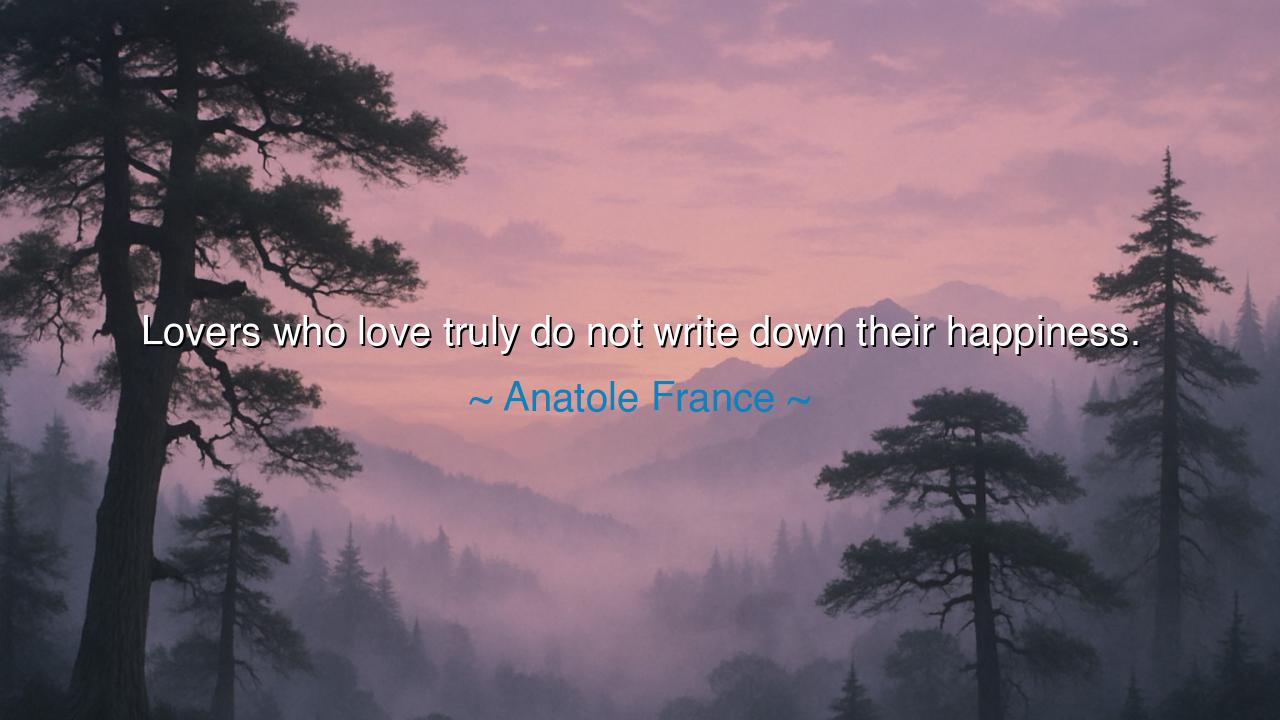
Lovers who love truly do not write down their happiness.






The words of Anatole France — “Lovers who love truly do not write down their happiness.” — glide like a whisper across the centuries, gentle yet profound. In this single line, the great French novelist and philosopher reveals an eternal secret about love: that its deepest joys cannot be captured by words, nor displayed before the world, for they belong to the sacred silence of the heart. He teaches that true love is not performative; it is not measured by how it is spoken of, but by how it is lived and felt. The happiness of real lovers, he says, is too pure, too inward, too divine to be written or proclaimed — it exists beyond the reach of language, in that mysterious realm where soul meets soul.
Anatole France lived in the late 19th and early 20th centuries, an age of reason and romanticism entwined. A lover of art and humanity, he understood that the greatest truths are those that dwell in quiet — the truths that do not clamor for attention, but glow softly, like a lamp behind closed shutters. He had seen, perhaps, how much of love the world tries to turn into spectacle — the declarations, the sonnets, the vows, the promises written in ink but not always kept in spirit. Yet he also saw that those who love with sincerity and depth feel no need to announce it. Their happiness flows silently between them, unseen by others, yet vast and radiant as the sea beneath the moon.
True love, he reminds us, is humble. It does not boast, it does not seek to be immortalized in verse, for it already partakes in eternity through its purity. The lovers who “do not write down their happiness” are not mute because they lack passion — they are silent because their hearts are full. When joy overflows, words become inadequate. The more profound the feeling, the less it demands to be spoken. In this sense, silence itself becomes the language of devotion, a sacred exchange that needs no witness but the beloved.
There is a story told of Antony and Cleopatra, whose names have echoed through time as the symbols of grand and tragic love. Their affair was written about by poets, chronicled by historians, and immortalized by Shakespeare himself. Yet what we know are the public gestures — the splendor of their banquets, the drama of their downfall. The world remembers their spectacle, but not the quiet moments that bound their hearts — the unrecorded glances, the laughter shared in stillness, the courage drawn from one another’s presence. Those moments, too precious for parchment, are the ones that gave their love its soul. The world may have written their story, but their happiness — if it truly existed — belonged to them alone.
France’s insight carries a subtle warning: that when love seeks too much expression, it risks becoming less real. The more one strives to define happiness in words, the more it slips away. The poets who write endlessly of love may capture its shadow, but never its substance. For love that must constantly be proven or displayed begins to wither under the gaze of others. True love is not exhibition but communion. It dwells in the unseen gestures — the gentle touch, the patient understanding, the shared silence that says what language cannot.
And yet, this truth is not meant to condemn expression, but to remind us that happiness is most authentic when it is lived, not narrated. There is a difference between speaking love and performing it; between writing of joy and embodying it. The ancients knew this: in many sacred traditions, the holiest acts were done in secret, unseen by all but the gods. So it is with love — its holiness thrives in privacy. The lovers who are most blessed are those who, even in the quietest moments, feel that they are in the presence of something divine, something that no pen or poet can ever fully contain.
So, my friend, take this teaching to heart: do not seek to record every joy or declare every affection. Let your love be living proof of itself. Cherish the silence where happiness breathes, for not all treasures are meant to be shared with the world. When your heart overflows, give thanks in stillness; when love fills you, let it shape your deeds rather than your words. The world may never know the depth of your joy, but that is as it should be — for what is true does not need to be told.
And remember the wisdom of Anatole France: “Lovers who love truly do not write down their happiness.” For their love is not a story — it is a sacred reality, written not on paper, but on the soul. It endures not through memory, but through presence. To love truly is to live quietly in that sacred joy, where words fall silent, and only the heart speaks — softly, eternally, beyond all time.






AAdministratorAdministrator
Welcome, honored guests. Please leave a comment, we will respond soon